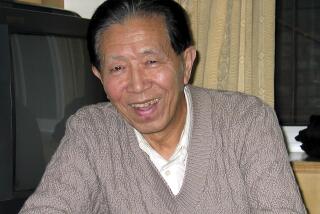Jiang Hua; Presided Over Trial of the ‘Gang of Four’
- Share via
Jiang Hua, 93, chief judge of China’s highest court who oversaw the trial of Mao Tse-tung’s widow and other members of the “Gang of Four.” Jiang gained influence as head of the Zhejiang provincial Communist Party apparatus in the 1950s. But he was purged in 1967, soon after the start of the Cultural Revolution, Mao’s experiment with radical communism that plunged China into political turmoil and economic backwardness. As Mao’s power waned, Jiang was appointed president of the Supreme People’s Court in 1975. In 1980--four years after Mao’s death and the arrest of his widow, Jiang Qing, and her three Politburo allies who made up the rest of the “Gang of Four”--Jiang Hua was named president of the special tribunal set up to try them for Cultural Revolution excesses. During the sensational trial, which helped mark reformer Deng Xiaoping’s break with Mao’s radical legacy, Jiang Qing railed at the judges, denouncing them as fascists and Chinese Nationalist agents. Charging her with contempt, Jiang Hua told her that she had “disrupted the order of the court and you are liable to receive a heavier sentence.” In the end, the court sentenced her to death. Her sentence was later commuted to life in prison, but she committed suicide in 1991. Jiang Hua said in a report to China’s National People’s Congress in 1980 that the court had examined 860,000 criminal cases tried during the Cultural Revolution and found that more than 82,000 people had been unjustly or falsely charged or sentenced. He said the court’s work showed that truth must be sought from facts and that subjectivism must be opposed. The state-run Xinhua News Agency and China Central Television did not specify the cause of the chief judge’s death. On Friday in Hangzhou, China.
More to Read
Sign up for Essential California
The most important California stories and recommendations in your inbox every morning.
You may occasionally receive promotional content from the Los Angeles Times.













